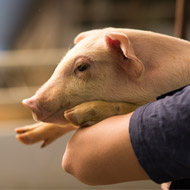
Exclusive deal signed with global leader in animal genetics
Pigs that are resistant to Porcine Reproductive and Respiratory Syndrome (PRRS) have been developed by researchers in the United States.
Scientists have long tried to understand how PRRS infects pigs. Until recently, researchers believed the virus entered pigs by being inhaled into the lungs, where it attached to a protein called sialoadhesin.
But two years ago, a team from the University of Missouri found that the elimination of sialoadhesin had no effect on a pig’s likelihood of developing PRRS. A second protein, known as CD163, was thought to “uncoat” the virus and allow it to infect pigs.
In this latest study, published in Nature Biotechnology, researchers set out to see if they could prevent pigs from producing CD163.
The team genetically engineered the gene that makes CD163 so the pigs could no longer produce it. Next, they infected the pigs and found that those without CD163 never got sick, nor did they show any other changes in their development.
Study co-author Kristin Whitworth said that the discovery “could have enormous implications for pig producers and the food industry throughout the world.”
In light of their results, the University of Missouri has signed an exclusive global licensing deal for the potential future commercialisation of the virus-resistant pigs with Genus, plc - a global leader in animal genetics.
The University said in a press release that, if the development stage is a success, the commercial partner will seek the necessary approvals and registration from governments before a wider market release.



 The Animal and Plant Health Agency (APHA) has updated its online reporting service for dead wild birds.
The Animal and Plant Health Agency (APHA) has updated its online reporting service for dead wild birds.